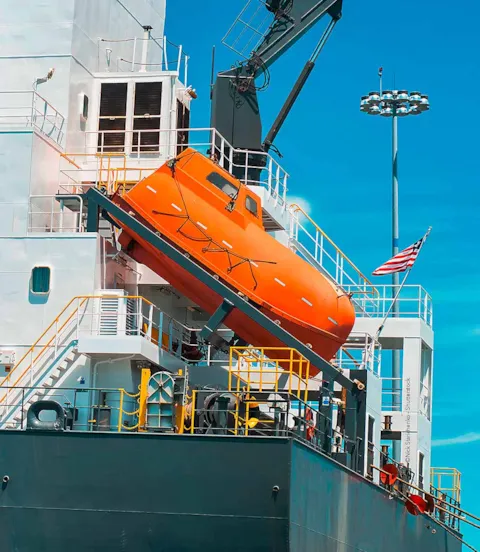A proactive approach for safety - Updated
Safety is what the regulatory work of IMO and classification societies is all about. In June 2019, the 101st session of IMO’s Maritime Safety Committee (MSC) addressed a number of important concerns, reflected in a regulation philosophy that promises more flexibility.
While in the past, IMO and other regulatory bodies typically issued regulations in response to incidents, the trend today is to be proactive while pursuing a goal-based regulatory approach that defines what should be achieved, rather than how to achieve it. This provides flexibility for designers to reap the full benefits of advanced technology. A number of IMO instruments approved by MSC 101 take this approach.

Autonomous ships
One of the most significant developments the maritime sector has witnessed in recent years is the prospect of autonomous ships: vessels operating internationally with little to no human intervention, relying on artificial intelligence, sensors and advanced data processing.
MSC 101 finalized draft interim guidelines for trials of maritime autonomous surface ships (MASS). As a basic principle, trials of autonomous ships shall meet at least the same level of safety, security, and environmental protection as required for conventional ships.

Fuel oil safety
Following the introduction of the 0.50% sulphur limit in marine fuel oil from 1 January 2020, IMO committed themselves to developing further measures to enhance ship safety with regard to fuel oil.
Interim measures for enhancing ship safety relating to use of fuel oil were developed and approved at MSC 101. It is recommended that Member States report to the IMO confirmed cases where delivered fuel failed to meet the flashpoint requirement, or where delivered fuel jeopardized the safety of ships and persons on board. Member States are further recommended to encourage the widest possible application of the industry standard for marine distillate fuels (ISO 8217:2017). These interim measures are set out in the new resolution MSC.465(101).
MSC 101 also developed an action plan for how to progress further work, including development of mandatory measures, targeting finalization in 2021.

Safety of ships operating in polar waters
The Polar Code, in force since 2017, was just the beginning: IMO has developed recommendations for navigation and communication equipment as well as for life-saving appliances for ships operating in polar waters. The interim guidelines outline recommendations to mitigate hazards related to operating in inhospitable polar environments.
The new Guidance document for navigation and communication equipment addresses environmental factors such as polar temperatures, mechanical shock testing to withstand ice breaking situations, ice accretion and battery performances in cold temperatures.
The new interim Guidelines for life-saving appliances and arrangements (LSA) outline recommendations for mitigating hazards based on assessment criteria. Such criteria includes maximum expected time of rescue, operation at polar service temperatures, operation in ice, ice accretion of life-saving appliances and arrangements, the effect of operation in high latitudes, operation in extended periods of darkness and the possibility of abandonment into ice or land. It should be noted that the recommendations to carry additional clothing, survival equipment and water may affect the capacity of the survival craft. However, the actual capacity adjustment, if any, would be dependent on factors such as insulation and heating of the LSA.
MSC 101 also addressed the risks related to fishing vessels, yachts, and other vessels not certified under the SOLAS convention that operate in polar waters. While the Polar Code addresses risks that are specific to operations in polar waters, the requirements are supplementary to and mandated by the SOLAS convention. It was agreed that IMO should encourage Member States to also apply Polar Code safety measures to non-SOLAS ships operating in polar waters.

Safe mooring operations
To improve the safety of mooring operations, MSC 101 approved draft amendments to SOLAS and associated guidelines on design, inspection, maintenance and equipment. The requirements will apply to all new cargo and passenger ships. The inspection and maintenance requirements for mooring equipment, including lines, are expected to be applied retroactively.
The amendments and new guidelines are expected to enter into force 1 January 2024, subject to adoption by MSC 102 in May 2020.

Safety of ro-ro passenger ships
Two IMO proposals addressed potential hazards on board ro-ro and similar motor vehicle-carrying vessels: a regulatory amendment says openings to ventilation systems for closed spaces must be considered as flooding points in stability calculations.
To address fire risks on ro-ro decks of passenger ships, typically associated with reefer units and electrical systems, MSC 101 approved interim guidelines detailing operational measures and recommendations for the design of fire safety systems on board new ro-ro passenger ships, such as enhanced fire detection technology, CCTV and non-open ro-ro decks. Vessels with DNV GL additional class notation F (A, M, C), 2018 or later are already in line with this best practice.
Owners and ship operators are encouraged to review their ro-ro passenger ships with open vehicle decks or weather decks to make sure there is a sufficient distance between permanent openings and the survival craft.

Flexibility in design of life-saving appliances
SOLAS allows life-saving appliances and arrangements to deviate from prescriptive requirements, provided an equivalent level of safety is achieved and the intent of the SOLAS requirements are met. The MSC 101 approved revised guidelines concerning alternative life-saving appliance design. The guidelines set goals and provide functional requirements, in an effort to provide flexibility in the design of innovative life-saving appliances. The revised guidelines may for example be relevant for large lifeboats exceeding the maximum carrying capacity of a “standard” lifeboat.

Watertight integrity
IMO has reviewed the SOLAS watertight integrity design criteria for consistency with the probabilistic damage stability approach introduced in 2009. Amendments were approved by MSC 101, addressing inter alia progressive flooding, valves in the collision bulkhead, watertight doors and other elements aiming to better cover all watertight boundaries on or above the bulkhead deck in passenger ships.
The amendments will apply to new ships and are expected to enter into force 1 January 2024, subject to adoption by MSC 102 in May 2020.

E-navigation
The IMO e-navigation initiative seeks to increase safety at sea by ensuring compatibility between various sophisticated electronic navigational tools. As part of this strategy, MSC 101 approved inter alia guidelines describing standard displays and controls. The MSC 101 also adopted corresponding amendments to the performance standards for presentation of information on navigational displays. The amendments will enter into force on 1 January 2024.

- TT-Line GmbH & Co. KG
